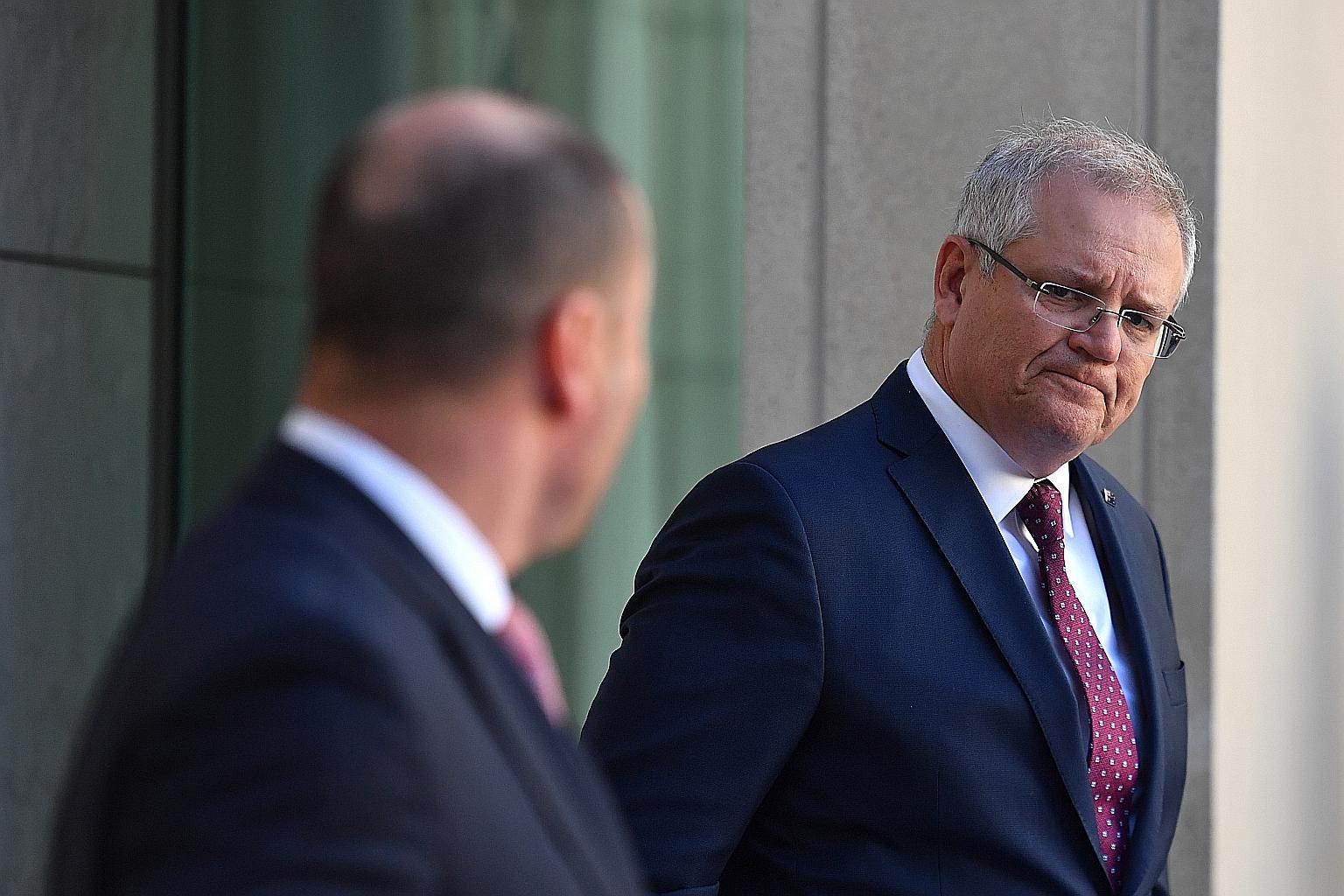Australia won't yield to 'coercion' from China, says PM Morrison
'I'm never going to trade our values' in response to threats, he insists amid worsening ties
Sign up now: Get ST's newsletters delivered to your inbox

Australia will "never be intimidated by threats from wherever they come", Prime Minister Scott Morrison says.
Australian Prime Minister Scott Morrison yesterday insisted Canberra will not surrender to "coercion" from Beijing after a series of Chinese moves to curb trade that included a warning to students not to travel to Australia due to "racist incidents".
Responding to growing tensions that threaten to cripple the country's main export sectors, Mr Morrison described claims of Australian racism towards Chinese students as "rubbish".
He said Australia will "never be intimidated by threats from wherever they come". "I'm never going to trade our values in response to coercion from wherever it comes," he told 2GB Radio.
China is Australia's largest trading partner, accounting for 36 per cent of Australian exports. It is the largest buyer of Australian iron ore and the biggest source of foreign students and tourists in Australia.
But ties between the two countries, which were already tense, have deteriorated since the outbreak of the Covid-19 pandemic.
China was infuriated by Australia's call for an independent inquiry into the origins of the coronavirus - a move that Beijing believed was targeted at it.
In recent weeks, China has barred imports of some Australian beef and imposed an 80 per cent tariff on Australian barley, though its officials denied these moves were retribution.
Last Friday, China warned its population to avoid going to Australia due to the threat of racism.
"There has been an alarming increase recently in acts of racial discrimination and violence against Chinese and Asians in Australia, due to the impact of the Covid-19 pandemic," said China's Ministry of Culture and Tourism.
This warning came as Australia's tourism sector was already reeling from devastating bush fires during the recent summer, followed by the ban on international travel to prevent the spread of Covid-19.
Australia's tourism sector generated A$22.5 billion (S$21.5 billion) last year from foreign visitors, making it the nation's fifth largest export. More than 1.4 million Chinese tourists visited Australia last year.
On Tuesday, China dealt a further blow, saying its students should reconsider plans to study in Australia, also because of claims of racism. "Multiple discriminatory events against Asians happened in Australia" during the pandemic, said China's Education Ministry.
The warning threatens to damage Australia's international education sector, which is its fourth largest export and was worth A$38 billion last year. China is the largest source of Australia's foreign students, making up 28 per cent of the total last year.
The sector has been urgently trying to lure foreign students back when international travel resumes and is exploring special arrangements to allow students to safely fly to Australia and quarantine in special accommodation.
Canberra this week roundly rejected China's claims that Australia is unsafe for Chinese or Asian visitors. But figures collected by police and anti-discrimination agencies indicate there has been an increase in racist incidents since the Covid-19 outbreak, though the overall numbers are fairly low.
The Australian Human Rights Commission, an independent government agency, has received an increase in complaints of racism since February, though numbers reportedly dropped last month.
But there have been some highly publicised and graphic cases of racist attacks, including a student from Hong Kong who was punched for wearing a face mask, and a case in which two Chinese students in Melbourne were abused and hit by two women yelling "go back to China".
However, Chinese-Australian and Asian-Australian community groups and leaders have largely said such racism is not the norm. The director of the Australian National University's Centre for Asian-Australian Leadership, Mr Jieh-Yung Lo, who is Chinese-Australian, said Australia needed to address recent increases in racism.
"It's still safe to come to Australia to study, but at the same time, it's important not to brush away the emergence of Covid-19-inspired racism," he told ABC News.
Australia's Trade Minister, Mr Simon Birmingham, said there had been instances of racism towards Asian-Australians. But he insisted the country was safe, saying Australia encouraged people to condemn racism and to report all incidents to the authorities.
The diplomatic tensions could take a heavy toll on Australia, especially as new data showed commercial ties with China were already weakening.
According to a report this week released by KPMG and the University of Sydney, Chinese investment in Australia fell 58 per cent last year to A$3.4 billion, the lowest level since 2007. The drop has been attributed to tighter screening of foreign investment and a shift by Chinese state-owned firms away from investing in developed nations.
Last week, Australia moved to tighten the screening of foreign investment, imposing a new national security test to apply to critical infrastructure. The move is seen as aimed at Beijing, and is likely to further crimp Chinese investment flows and add to the frosty relations between the two countries.


